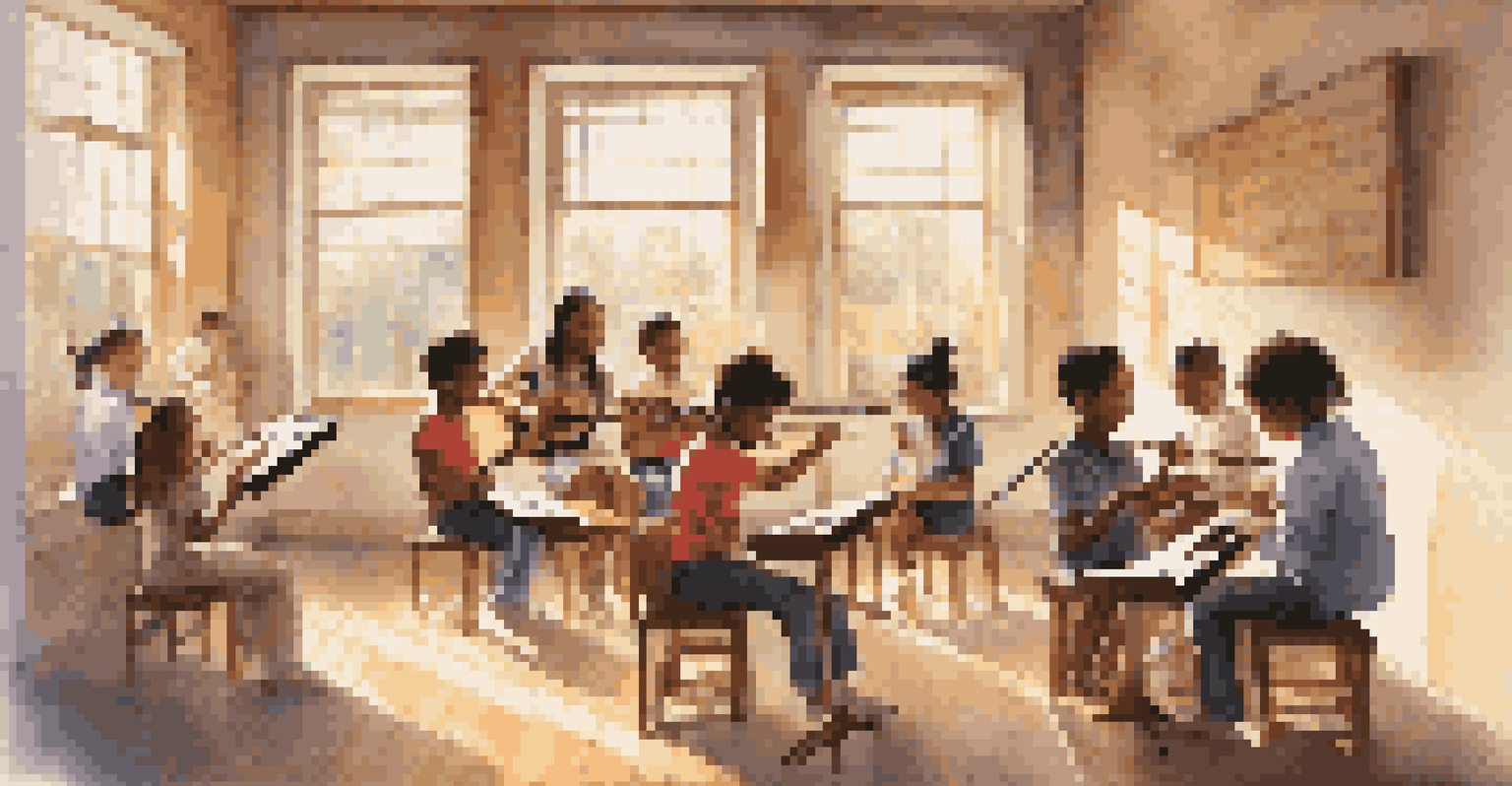The Impact of Cultural Differences on Music Perception and Brain

Understanding Cultural Influence on Music Preferences
Music is often a reflection of cultural identity, shaping our preferences and tastes. Different cultures emphasize various elements in music, such as rhythm, melody, or harmony, which can drastically influence what we enjoy. For instance, while Western music often focuses on harmony and melody, African music frequently highlights rhythm and improvisation. These cultural distinctions not only affect our preferences but also our emotional responses to music.
Music is the shorthand of emotion.
Moreover, cultural background can determine how we interpret lyrics and themes in songs. A person from a particular culture may relate to certain narratives or emotions expressed in music that someone from another culture might find unfamiliar or even confusing. This deeper connection to music can foster a sense of belonging and identity within a community, reinforcing the idea that music is a universal yet culturally specific language.
Additionally, cultural norms and values play a significant role in shaping musical experiences. For example, in cultures where community gatherings and shared experiences are emphasized, music often serves as a communal activity, enhancing social bonds. On the other hand, in cultures that prioritize individualism, music might be experienced more as a personal journey. Understanding these dynamics helps us appreciate the rich diversity of music across the globe.
How Cultural Background Affects Brain Responses to Music
Recent research indicates that our cultural background can influence how our brains respond to music. For instance, studies using brain imaging techniques have shown that people from different cultures exhibit distinct neural patterns when listening to the same piece of music. This suggests that our brains are wired to process music in ways that align with our cultural experiences and exposure, highlighting the interplay between culture and cognitive function.

Moreover, the emotional impact of music can vary based on cultural context. For example, a piece of music that evokes joy in one culture may elicit sadness in another due to differing associations and meanings attached to certain musical elements. This phenomenon reflects the deep-rooted connections between cultural upbringing and emotional interpretation, demonstrating that music is not just heard but felt differently across cultures.
Culture Shapes Music Preferences
Our musical tastes are deeply influenced by cultural identity, which affects how we interpret and connect with different music styles.
Interestingly, these variations in brain responses also extend to the skills we develop related to music. Musicians trained in Western classical music may excel in recognizing harmonic structures, while those from a jazz or folk background might have heightened improvisational skills. This adaptability of our brain showcases the profound impact that cultural differences have on our musical cognition and abilities.
The Role of Exposure in Shaping Musical Preferences
Exposure to different musical styles is crucial in shaping our musical preferences and perceptions. As we grow up, the types of music we listen to, whether through family, friends, or cultural events, significantly influence our tastes. For example, a child raised in a household that values classical music may develop a preference for its complexity and structure, while another exposed to pop music may favor catchy melodies and rhythms.
Without music, life would be a mistake.
Furthermore, the availability of diverse musical genres through technology has broadened our exposure, allowing individuals to explore music from various cultures. Platforms like streaming services enable listeners to discover global sounds, promoting cross-cultural appreciation. This accessibility can lead to a richer understanding of music and foster a sense of empathy as we learn to appreciate the stories and emotions behind different musical traditions.
However, while exposure can enhance our musical palette, it can also create a clash of preferences. Individuals may find themselves torn between traditional music from their culture and contemporary genres they encounter through various media. Navigating these preferences can lead to unique musical identities, where individuals blend influences from multiple cultures, creating new forms of expression that celebrate diversity.
The Impact of Music Education on Cultural Understanding
Music education plays a pivotal role in fostering cultural understanding and appreciation. By exposing students to a variety of musical traditions from around the world, educators can encourage a broader perspective on music and its cultural significance. This enriched understanding can lead to greater empathy and respect for diverse musical practices, promoting a more inclusive worldview.
Moreover, learning about different musical styles can enhance students' cognitive skills, such as creativity and critical thinking. For example, engaging with complex rhythms found in African drumming or exploring the improvisational elements of jazz can challenge students to think outside the box. This not only deepens their musical knowledge but also reinforces the idea that music is a dynamic, evolving art form shaped by cultural influences.
Brain Responses Vary by Culture
Research shows that cultural backgrounds lead to distinct brain responses to music, illustrating the link between culture and cognitive processing.
Additionally, music education can serve as a bridge between cultures, fostering collaboration and interaction among students from diverse backgrounds. Joint musical projects or performances can create opportunities for cultural exchange, allowing students to share their unique musical heritages. These experiences enrich the educational journey and promote a sense of community and belonging among participants.
Emotional Responses to Music: A Cultural Lens
Emotions play a significant role in how we perceive and respond to music, and culture heavily influences these emotional responses. For instance, certain musical scales or chord progressions may evoke feelings of happiness or sadness depending on the listener's cultural background. This interplay between culture and emotion highlights the complexity of our musical experiences, where the same piece can elicit vastly different reactions.
Additionally, cultural rituals and traditions often dictate how music is used to express emotions. In some cultures, music is integral to celebrations, while in others, it may be used in mourning practices. These contextual uses of music shape our emotional connections to it, reinforcing the idea that music is not just an art form but a vital part of human expression across different cultures.
Understanding these emotional responses can help musicians and composers create works that resonate with diverse audiences. By considering cultural context, artists can craft pieces that evoke specific feelings, connecting with listeners on a deeper level. This awareness not only enriches the music itself but also fosters a greater appreciation for the diverse emotional landscapes shaped by cultural differences.
Cultural Identity and Music: A Two-Way Street
Cultural identity and music share a symbiotic relationship, where each influences the other. Music often serves as a medium for expressing cultural identity, allowing individuals to showcase their heritage and experiences. For example, genres like reggae and flamenco are not just music styles; they encapsulate the history and struggles of the cultures from which they originate.
Conversely, as music evolves and incorporates elements from various cultures, it can reshape cultural identities. The fusion of different musical styles can lead to the emergence of new genres, reflecting a blend of influences. This dynamic interplay creates a rich tapestry of musical expression that celebrates diversity while also challenging traditional notions of cultural boundaries.
Music Education Fosters Understanding
Exposure to diverse musical traditions in education promotes cultural appreciation and enhances cognitive skills among students.
Moreover, the global nature of music today allows for greater cross-cultural exchanges, where artists collaborate and share influences across borders. This interconnectedness fosters a sense of shared identity among musicians and listeners alike, highlighting the idea that music can be a unifying force in a world often divided by cultural differences.
The Future of Music Perception in a Globalized World
As the world becomes increasingly interconnected, the way we perceive and engage with music is evolving. Globalization has led to the blending of musical styles, creating opportunities for unique collaborations and innovations. This shift challenges traditional notions of cultural ownership and encourages a more fluid understanding of music as a shared human experience.
Moreover, advancements in technology have made it easier for people to access and explore diverse musical genres. With just a few clicks, listeners can dive into a world of sounds that were previously unfamiliar. This accessibility not only broadens our musical horizons but also fosters appreciation for different cultural expressions, enriching our overall experience of music.

Looking ahead, it will be interesting to see how these cultural exchanges shape the future of music. As artists continue to experiment with blending styles and influences, we may witness the birth of entirely new genres that reflect our globalized society. Ultimately, this evolution promises to deepen our understanding of music's role as a bridge between cultures, celebrating the beauty of diversity in artistic expression.